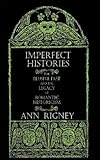Imperfect Histories : The Elusive Past and the Legacy of Romantic Historicism / Ann Rigney.
Material type: TextPublisher: Ithaca, NY : Cornell University Press, [2018]Copyright date: ©2001Description: 1 online resource (224 p.)Content type:
TextPublisher: Ithaca, NY : Cornell University Press, [2018]Copyright date: ©2001Description: 1 online resource (224 p.)Content type: - 9781501729683
- English fiction -- 19th century -- History and criticism
- Historical fiction, English -- History and criticism
- Historical fiction, French -- History and criticism
- Historicism -- History -- 19th century
- Historiography -- France -- History -- 19th century
- Historiography -- Great Britain -- History -- 19th century
- Literature and history -- France -- History -- 19th century
- Literature and history -- Great Britain -- History -- 19th century
- Romanticism -- France
- Romanticism -- Great Britain
- History
- LITERARY CRITICISM / Subjects & Themes / Historical Events
- 823/.0810908 21
- PR868.H5
- online - DeGruyter
| Item type | Current library | Call number | URL | Status | Notes | Barcode | |
|---|---|---|---|---|---|---|---|
 eBook
eBook
|
Biblioteca "Angelicum" Pont. Univ. S.Tommaso d'Aquino Nuvola online | online - DeGruyter (Browse shelf(Opens below)) | Online access | Not for loan (Accesso limitato) | Accesso per gli utenti autorizzati / Access for authorized users | (dgr)9781501729683 |
Frontmatter -- Contents -- Acknowledgments -- Introduction -- 1. Hybridity: The Case of Sir Walter Scott -- 2. Representability: Cultural History and the Fear of Long Books -- 3. Sublimity: Thomas Carlyle and the Aesthetics of Historical Ignorance -- 4. Literature and the Longing for History -- Appendix -- Notes -- Bibliography -- Index
restricted access online access with authorization star
http://purl.org/coar/access_right/c_16ec
Imperfect Histories puts "imperfection" at the heart of a theory of historical representation. Ann Rigney shows how historical writing involves dealing with intractable subjects that resist our efforts to know and to shape them. Those who write history, she says, engage in an ongoing struggle to match up what they find relevant in the past with the information and interpretive models at their disposal. Chronic dissatisfaction is at the heart of historical practice. This is especially evident in the various attempts made over the last two centuries to write an "alternative" history of everyday experience. Focusing on historical writing in the last decades of the eighteenth century and the first half of the nineteenth, Rigney analyzes a wide range of works by Walter Scott, Jules Michelet, Augustin Thierry, and Thomas Carlyle. She shows how the attempt to write an alternative history brought historical writing into a close yet fraught relationship with literature. The result is a new account of that relationship as it took shape in the romantic period and as it continues to influence contemporary practices.
Mode of access: Internet via World Wide Web.
In English.
Description based on online resource; title from PDF title page (publisher's Web site, viewed 26. Apr 2024)


